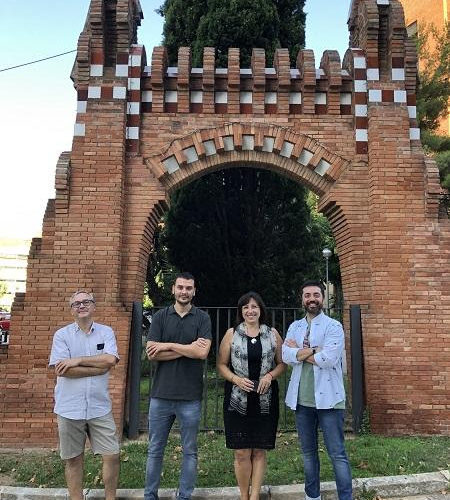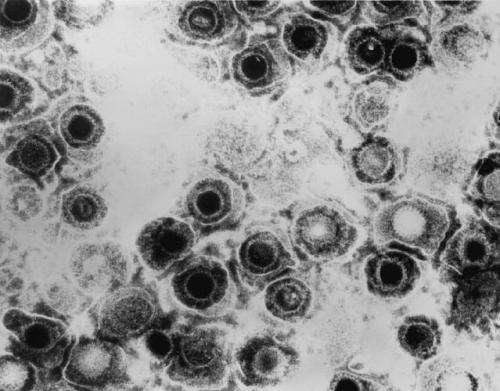By Chris Smith @chris_writes Doctors in Spain think they found a new coronavirus symptom that can easily go undiagnosed even in hospitalized patients. A mouth rash, or enanthem, appeared in roughly 30% of a small cohort of confirmed COVID-19 patients who also displayed skin rashes. The CDC doesn’t list skin rashes of any kind on...
Risk of sepsis greatest for patients with frailty, older age or urinary tract infections
Patients with frailty, older age and urinary tract infections (UTIs) are at greatest risk of developing sepsis following infection consultations in primary care, research has found. A research study published today in PLOS Medicine by researchers from King’s College London, with funding from National Institute for Health Research (NIHR), aimed to estimate the probability of...
New study identifies 21 existing drugs that could treat COVID-19
by Sanford Burnham Prebys Medical Discovery Institute Discovery Institute, gestures to experimental assays that test for compounds that may treat COVID-19. Credit: Sanford Burnham Prebys Medical Discovery Institute A Nature study authored by a global team of scientists and led by Sumit Chanda, Ph.D., professor at Sanford Burnham Prebys Medical Discovery Institute, has identified 21...
Antioxidant cocktail key to preventing Alzheimer’s
Research from The University of Western Australia has found a diet rich in nutrients and antioxidants may prevent or even reverse the effects of Alzheimer’s disease. The study, published in Open Biology, found taking a combination of antioxidants at increasing doses was more beneficial at preventing the debilitating disease than any other treatment currently available....
Phage therapy shows potential for treating prosthetic joint infections
ROCHESTER, Minn. — Bacteriophages, or phages, may play a significant role in treating complex bacterial infections in prosthetic joints, according to new Mayo Clinic research. The findings suggest phage therapy could provide a potential treatment for managing such infections, including those involving antibiotic-resistant microbes. The research is published in the July issue of Clinical Infectious...
AsEH enzyme: A new pharmacological target against Alzheimer’s disease
Drugs with neuroprotector effects UNIVERSITY OF BARCELONA FROM LEFT TO RIGHT, SANTIAGO VÁZQUEZ, CARLES GALDEANO, MERCÈ PALLÀS AND CHRISTIAN GRIÑÁN-FERRÉ (FACULTY OF PHARMACY AND FOOD SCIENCES/UNIVERSITY OF BARCELONA)…. view more CREDIT: UNIVERSITY OF BARCELONA A UB study published in the journal Neurotherapeutics has validated a new pharmacological target for Alzheimer’s disease. The results show the...
L-type calcium channel blockers may contribute to heart failure, study finds
by Sara Lajeunesse, Pennsylvania State University L-type calcium channel blockers (LCCBs)—the most widely used drugs for treating hypertension—may harm the heart as much as help it, according to a new study. The research team, led by Penn State, found that in rats and human cells in vitro, LCCBs cause changes in blood vessels—known as vascular...
Rely on gut feeling? New research identifies how second brain in gut communicates
by Flinders University You’re faced with a big decision so your second brain provides what’s normally referred to as “gut instinct,” but how did this sensation reach you before it was too late? The enteric nervous system (ENS) is an extensive network of neurons and transmitters wrapped in and around the human gut with the...
In cell studies, seaweed extract outperforms remdesivir in blocking COVID-19 virus
by Mary L. Martialay, Rensselaer Polytechnic Institute In a test of antiviral effectiveness against the virus that causes COVID-19, an extract from edible seaweeds substantially outperformed remdesivir, the current standard antiviral used to combat the disease. Heparin, a common blood thinner, and a heparin variant stripped of its anticoagulant properties, performed on par with remdesivir...
Antiviral method against herpes paves the way for combatting incurable viral infections
by Lund University Researchers at Lund University in Sweden have discovered a new method to treat human herpes viruses. The new broad-spectrum method targets physical properties in the genome of the virus rather than viral proteins, which have previously been targeted. The treatment consists of new molecules that penetrate the protein shell of the virus...







